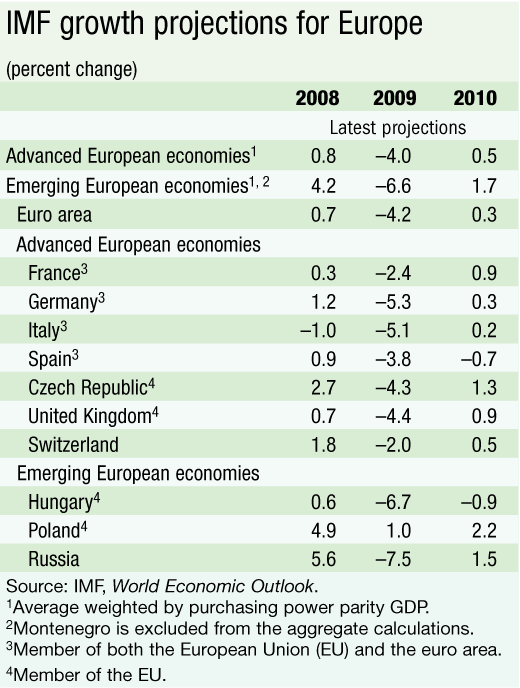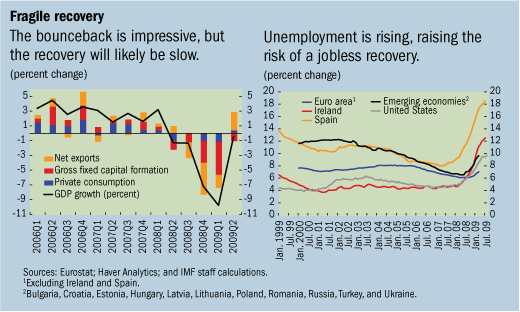
Typical street scene in Santa Ana, El Salvador. (Photo: iStock)
IMF Survey: Europe: IMF Sees Slow and Fragile Recovery
October 3, 2009
- Recovery in Europe visible but fragile
- Repairing financial system remains essential
- Payoff for sound policies, structural reforms has increased
Europe’s long recession is bottoming out, reflecting strong policy action, a rebound in confidence, and a tentative upswing in global trade, the IMF’s new regional outlook says.

European employment might adjust slowly to the upswing, raising the prospect of a jobless recovery, IMF says (photo: David Hecker/AFP)
REGIONAL ECONOMIC OUTLOOK
Faced with the crisis, policymakers stepped up to the plate and used a whole array of monetary, financial, and fiscal measures. They successfully put a floor under economic activity, eliminated the fears of a major financial meltdown, and stabilized demand, says the IMF’s Regional Economic Outlook for Europe, published October 3.
“Growth is around the corner, but the recovery will likely be slow and fragile,” Marek Belka, Director of the IMF’s European Department, said in Istanbul.
“Demand from Asia will not be strong enough to substitute for demand from the United States. Therefore, the responsibility for recovery will rest squarely on the shoulders of the European consumer,” he told a press briefing ahead of the IMF’s Annual Meetings in Turkey.
In most of Europe’s advanced economies, output is expected to return to growth in late 2009, albeit at very low levels. Many emerging economies should follow a similar pattern, but here the picture is more varied (see table). Countries faced with a steep decline in capital inflows will take longer to return to growth.
“To repair damage to potential growth, it's essential to press ahead with structural reforms,” Belka stressed. “Our call for structural reform has become almost a platitude but in the current situation, but the need for such reforms has never been more important.”

Recession is bottoming out
While Europe has turned the corner on the recession, the recovery will likely be slow and fragile. Due to the ongoing rebalancing of global demand, exports alone will probably not be able to drive the recovery, which in any case will be hampered by rising unemployment and scarce credit as banks continue to deleverage their balance sheets.
Even if the pickup in global trade proves stronger and longer lasting than anticipated, this could be offset by problems in Europe’s highly integrated banking sector, caused by bad loans tied to the recession or overhangs of foreign currency-denominated debt in emerging Europe. Employment might also adjust slowly to the upswing, raising the prospect of a jobless recovery, something which could dent confidence and hurt consumption and investment (see chart).
Longer-term growth at risk
The scope for recovery might also be limited by the impact of the crisis on potential growth and Europe’s well known structural rigidities. The region’s output potential has been severely weakened by the crisis, following a period of low investment, the threat of increasing structural unemployment, and the end of financial sector, real estate, and construction booms in a number of countries.
While some developments affecting potential growth are bound to correct themselves eventually, others tie into long-standing issues such as high levels of employment protection and unrealized growth opportunities in the services sector.
Urgent action needed
Given all these risks to future growth, policymakers have little choice but to press ahead with policies that can help secure a lasting and strong recovery. For the financial sector, this means finishing a job that began in a flurry of early interventions aimed at eliminating systemic risks. But this process has left in its wake fundamental weaknesses in both the financial stability framework and bank balance sheets, some of which have worsened further due to the recession. In the near term, the IMF recommends that policymakers take resolute action to assess the balance sheet risks faced by banks (here, recent European stress tests should help) and recapitalize or restructure viable institutions, while resolving others.
The overhaul of the EU’s financial stability arrangements should be implemented swiftly to guarantee effective coordination of financial supervision across borders, including between emerging and advanced economies. These new arrangements will also help protect Europe against future risks from the financial sector by guiding implementation of macroprudential regulation. Still on the to-do list is a framework for comprehensive cross-border crisis management, including tools for early intervention and cost-sharing rules.
Walking a tightrope
Policymakers also face the challenge of balancing macroeconomic policies that continue to provide support for the economy with well timed measures to phase out the extraordinary support that was needed during the crisis. Public finances across Europe have suffered from the double blow delivered by the crisis: lower growth and higher debt arising from fiscal stimuli and financial sector interventions. This “one-two punch” has added to looming pressures on fiscal policy arising from population aging.
Thus, while the fragility of the recovery requires following through with stimulus packages and letting automatic stabilizers work, plans to address sustainability concerns should be made and communicated now so that they can be implemented swiftly once a lasting recovery has set in.

Similarly, monetary policymakers should continue their support for the economy and keep all options open as long as the timing and strength of the recovery are uncertain and inflation remains subdued. But once the recovery takes hold, central banks will have to turn their attention to unwinding an unprecedented array of interventions. Such policies will allow them to reduce their footprint in financial markets to normal levels and eliminate the risk of moral hazard that follows interventions on the scale seen this past year.
Good policies pay off
After the worst crisis since the Great Depression, investors have become much more discerning. As a consequence, they now differentiate much more between Europe’s economies, looking closely at domestic factors and policies.
For many of Europe’s emerging economies, attracting capital has become much more difficult. However, this also means that countries which invest in a business-friendly environment, improve policy frameworks to reduce political uncertainty, and provide macroeconomic stability, are now much more likely to be rewarded with lower interest rate spreads and higher capital imports.
Financial assistance has eased the short-run burden of adjustment for some of the countries that were hit particularly hard by the slowdown in bank and market-based capital inflows. The IMF has worked with the European Union and other multilateral institutions to provide financial assistance in the form of Stand-By Arrangements and Flexible Credit Lines.
Many parent banks have pledged continued support to their subsidiaries in emerging markets through IMF-coordinated agreements. These efforts are paying off, but progress in normalizing access to private financing still is very uneven among countries. As the global recovery takes hold, attention will need to turn to strengthening competitiveness.
Bolstering future growth
Looking beyond the short run, bolstering potential growth may be the most important element of the strategy to secure a solid recovery. For advanced economies, labor and product markets reforms and efforts to rejuvenate the EU’s Lisbon agenda will be essential to ensure that the recovery does not run out of steam too soon. Similar reforms in emerging European economies will facilitate a smoother reallocation of labor to export-oriented sectors—a must in times of dwindling capital flows—and could raise their attractiveness for foreign investment.
Admittedly, the appetite for reform might be low with the trough of the recession barely passed. But there is a lot to be gained. Across the continent, lifting growth prospects in the medium run will help reduce the recovery’s vulnerability, make it easier to phase out extraordinary support measures, help address the fiscal burden created by the crisis, and prevent prolonged hardship for those that have lost their jobs in the crisis.
Comments on this article should be sent to imfsurvey@imf.org


